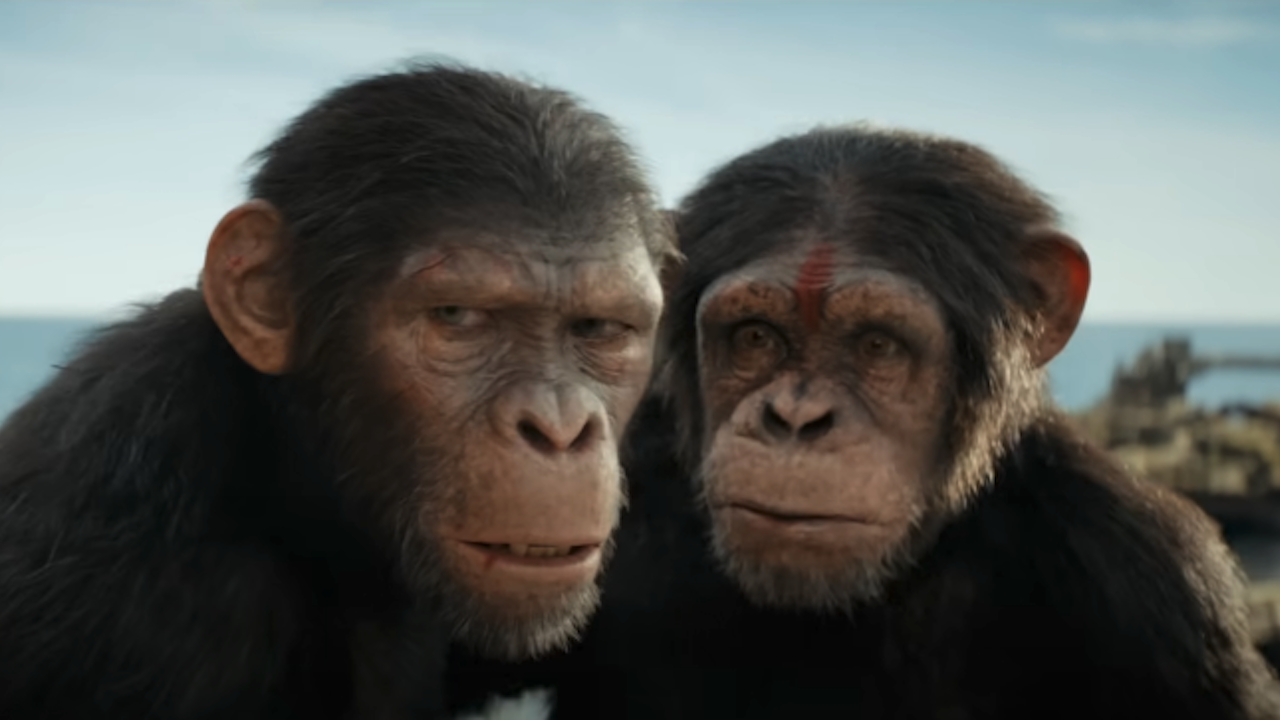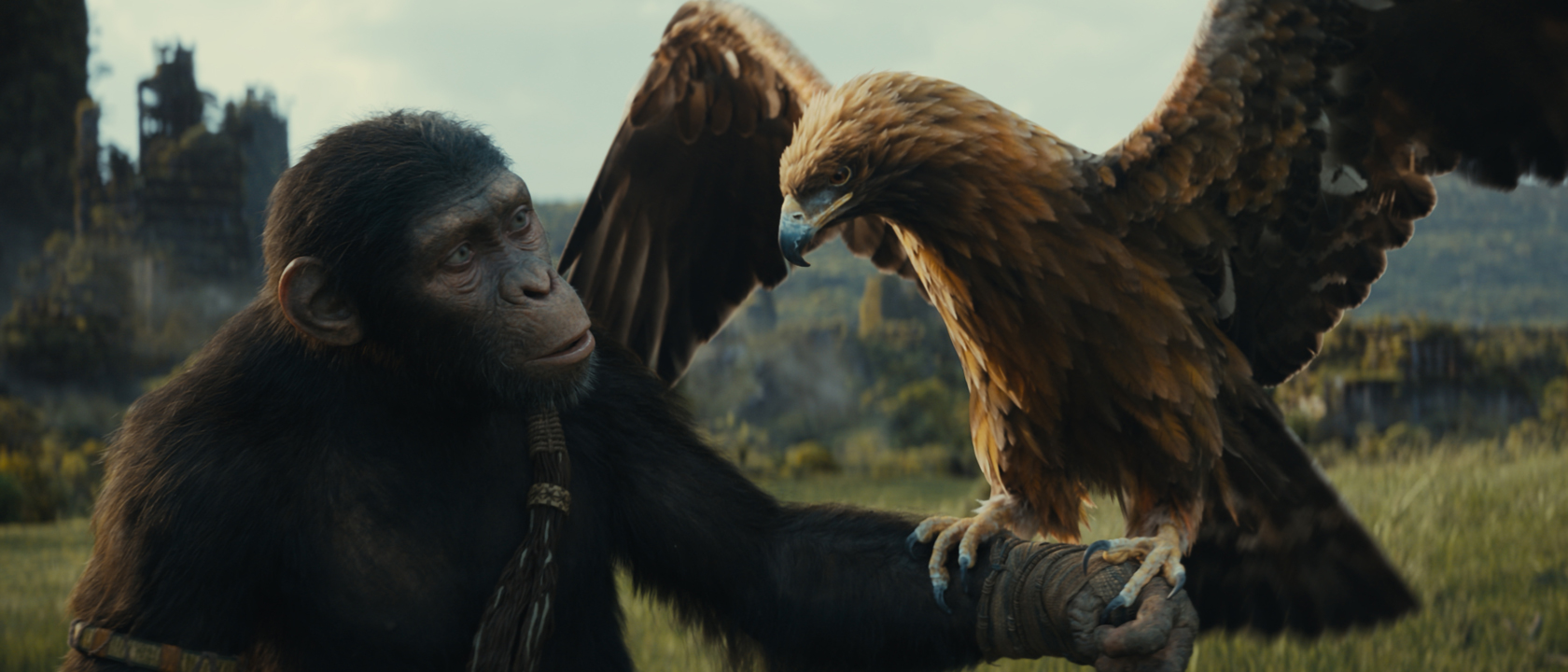The big screen Planet Of The Apes franchise has a terrific track record. The weakest chapters (namely Tim Burton’s 2001 remake of the original and 1973’s Battle For The Planet Of The Apes) at the very least feature some impressive cinematic artistry in their effects, and the greatest are science-fiction classics. They are deep and thoughtful stories about the nature of humanity that regularly reach unexpected, bleak, and powerful conclusions, and from the practical makeup in the original movies to the digital magic that audiences witnessed in the modern Caesar Trilogy, there is remarkable filmmaking craft to witness.

Release Date: May 10, 2024
Directed By: Wes Ball
Written By: Josh Friedman and Rick Jaffa & Amanda Silver and Patrick Aison
Starring: Owen Teague, Freya Allan, Kevin Durand, Peter Macon, and William H. Macy
Rating: PG-13 for intense sequences of sci-fi violence/action
Runtime: 145 minutes
This is a legacy that sets a high bar in advance of director Wes Ball’s Kingdom Of The Planet Of The Apes, a film that hopes to launch a new era of the franchise. To further the metaphor, it’s a bar on which the movie is able to get a firm grip, but it performs more of a loose hang than a pull-up. Like its canon cousins, it’s beautiful to look at – with stunning on-location photography and production design combined with the pairing of excellent visual effects and motion capture performances – and it features compelling characters and stakes, but its story doesn’t quite deliver the devastating punch and awe of its best predecessors. It’s not disappointing, but more good than great.
Kingdom Of The Planet Of The Apes distances itself from the legend of Andy Serkis’ Caesar by moving the timeline hundreds of years into the future (or “Many Generations,” as phrased in an early title card), and introduces chimpanzees Noa (Owen Teague), Anaya (Travis Jeffery) and Soona (Lydia Peckham) as they search for eggs and prepare for Bonding Day – a coming-of-age ceremony in their avian-centric ape clan that will see them paired with an eagle companion. This celebration is preempted by devastation, however, as a rival clan raids the settlment the night before and kidnaps all of the apes they don’t kill, with Anaya and Soona counted among the abducted and the body count including Noa’s father, Koro (Neil Sandilands).
After Noa awakens in a pile of rubble, he immediately accepts the responsibility of rescuing his family, friends, and neighbors and sets out on horseback to do so – earning help along the way from Raka (Peter Macon), a wise orangutan who instructs Noa about the teachings of Caesar, and Nova (Freya Allan), a young human woman who holds on to more than a few secrets. Together they discover a coastal kingdom ruled by a bonobo named Proximus Caesar (Kevin Durand), who has put his subjects to works trying to open a mysterious human-made vault.
Kingdom Of The Planet Of The Apes features peak visual effects, with sequences that will drop your jaw.
At this point in Planet Of The Apes’ franchise history, the impressive and extensive use of performance capture technology is a draw unto itself, and Kingdom Of The Planet Of The Apes advances that legacy featuring visuals that stun with photorealism. The aforementioned moment of Noa emerging from the wreckage of his home is one of many perfect examples – as you can’t help but be dazzled by fluttering flakes of ash from surrounding fires finely clinging to his fur.
The work done by the artists at Weta is akin to magic, but it’s also a collaboration with terrific performers who pick up the torch from Andy Serkis and find that special balance between human and simian that’s required for these evolved ape characters. There is incredible detail in facial expression and mannerisms. It asks for no mental leaps by the audience; it’s a convincing illusion that never falters and only delivers wonder.
Kingdom Of The Planet Of The Apes effectively plays with (and in some cases subverts) expectations from the franchise.
The excellent work of actors Owen Teague, Peter Macon and Kevin Durand in particular fuel the audience’s imagination and bring to life a trio of great characters. They are rich and full of personality, but the movie also doesn’t beat the audience over the head with exposition, and it instead reveals their nature with action.
There are some tropes and standards of which Kingdom Of The Planet Of The Apes makes use, with Noa undergoing a recognizable maturation narrative and Raka fulfilling the familiar orangutan role in this franchise – but there are still some standout surprises. Without giving too much away, Nova is a particularly different interpretation of the role compared to other canon incarnations, and her role in the story only gets more and more fascinating as the plot develops.
The latest Planet Of The Apes movies feels like it is set in a lived-in world, for better and for worse.
Between the lacking of explanation how the world has evolved since the age of Caesar and the engaging new protagonists, the movie is successful wrapping the audience back into this special world where the dynamic between apes and humans has wholly shifted – but it’s also a story that is hampered by being a middle chapter between the spread of the deadly Simian Flu pandemic and the distant future featured in the original 1968 Planet Of The Apes. It has its own angle to take in the development of the franchise’s big central conflict, but it’s not particularly bold or revelatory in a way that adds a new way to look at the core themes. The results in the finale not being able to deliver the massive emotional blows fans have come to expect… but it does set up a macro narrative that promises excitement to come.
Overall, Kingdom Of The Planet Of The Apes doesn’t have too much to add to the larger messages of the blockbuster series of films, but it is still a stirring adventure that establishes and develops exciting new characters and is stunning to look at. There are some standout issues that hold it back from being among the best stories in the continuity, but it executes enough exciting table setting to keep fans looking forward to more stories.

Eric Eisenberg is the Assistant Managing Editor at CinemaBlend. After graduating Boston University and earning a bachelor’s degree in journalism, he took a part-time job as a staff writer for CinemaBlend, and after six months was offered the opportunity to move to Los Angeles and take on a newly created West Coast Editor position. Over a decade later, he's continuing to advance his interests and expertise. In addition to conducting filmmaker interviews and contributing to the news and feature content of the site, Eric also oversees the Movie Reviews section, writes the the weekend box office report (published Sundays), and is the site's resident Stephen King expert. He has two King-related columns.











